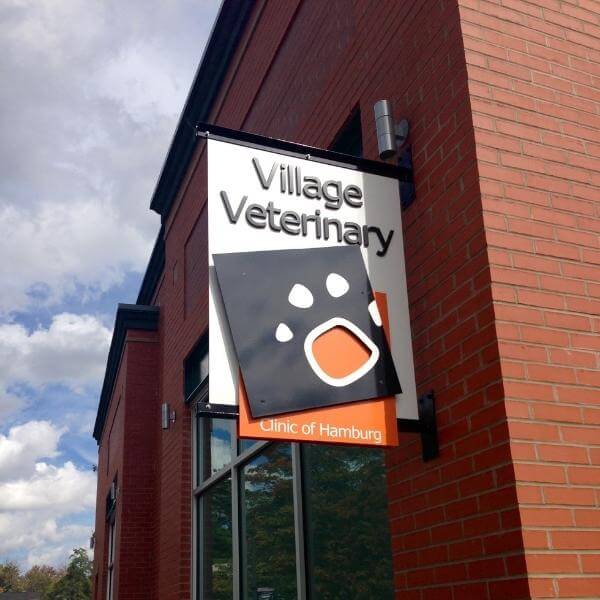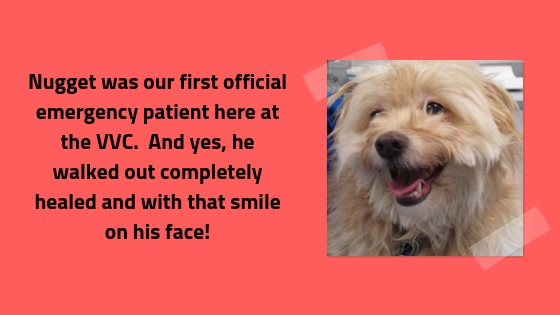Pet URGENT CARE
We would love it if nobody needed to utilize this particular service, but we understand reality. We provide emergency care for the local community and anyone in the greater Buffalo area.
Pet Urgent Care
If you notice something wrong with your pet and your regular veterinarian isn’t available, call us and we can provide some direction. If there’s something you can do to help right in your own home, we’ll suggest it. If it sounds like your pet would benefit from having our team check things out, we’ll certainly encourage that course of action. We get it that nobody wants to go to the emergency vet but we are here for you if needed.
In addition to our general practice, we also provide urgent care services for pet owners throughout Western New York, with the ability of overnight care for those patients requiring continual treatment and monitoring. An overnight care team here consists of a licensed veterinary technician along with a trained and experienced assistant.

Urgent Care Hours
We are open 7 days a week (we will be closed on Christmas Day)
- Monday – Friday: Doctors available for emergency appointments 8 am – 11 pm
- Saturday: Doctors available for emergency appointments 8 am- 9 pm
- Sunday: Doctors available for emergency appointments 8 am – 6 pm
We have a veterinary technician and support staff on-premises 24 hours a day, 7 days a week for patient monitoring and phone support.
Visiting Hours for In Hospital Patients
We love the look on all our patient’s faces when they get to see their families! Visiting is encouraged for all our hospitalized patients.
We ask that everyone call ahead prior to stopping in.
Visiting hours:
- Monday-Friday: 8am-7pm
- Saturday-Sunday: 8am-6pm
What Constitutes a Pet Emergency?
- Difficulty breathing
- Constant coughing
- Collapse
- Seizures
- Pale gums
- Abnormal behavior
- Toxin ingestion
- Allergic reaction
- Hit by car
- Bite Wounds
- Bloody diarrhea
- Bloated abdomen
- Heatstroke
- Sudden blindness
- Electrocution
- Extreme pain
- Falling from height/high rise
- Inability to use hind limbs
- Extreme bleeding
- Broken bones/open wounds
- Intractable retching/vomiting
- Straining or bloody urine
- Difficulty giving birth
- Weak, lethargic puppy/kitten
- Squinting, tearing, or red eyes
- Complication of chronic disease
CALL 716-646-4023 FOR EMERGENCY SERVICES!
Most common dog toxicities!
- Chocolate
- Mouse and Rat Poisons (rodenticides)
- Vitamins and Minerals (e.g., Vitamin D3, iron, etc.)
- Anti-inflammatory medications- NSAIDs (e.g., ibuprofen, naproxen, etc.)
- Cardiac Medications (e.g., calcium channel blockers, beta-blockers, etc.)
- Cold and Allergy Medications (e.g., pseudoephedrine, phenylephrine, etc.)
- Antidepressants (e.g., selective serotonin reuptake inhibitors)
- Xylitol (sugar substitute, an artificial sweetener found in items such as gum)
- Acetaminophen (e.g., Tylenol)
- Caffeine Pills
- ADHD medications (e.g., amphetamine)
- Marijuana
Common toxic foods for dogs and cats!
- Alcohol
- Apricots
- Avocado
- Bread Dough
- Caffeine
- Cherry
- Chocolate
- Currants
- Garlic
- Onion
- Hops (Beer)
- Grapes/Raisins
- Mushrooms
- Macadamia Nuts
- Salt
- Star Fruit
- Xylitol
Most common cat toxicities!
- Lilies (Lilium species)
- Spot-on flea/tick medication for dogs
- Household Cleaners
- Antidepressants (e.g., selective serotonin reuptake inhibitors)
- Essential Oils (e.g., wintergreen, oil of sweet birch, citrus oil (d-limonene), pine oils, Ylang Ylang oil,
- peppermint oil, cinnamon oil, pennyroyal oil, clove oil, eucalyptus oil, and tea tree oil)
- Anti-inflammatory medications- NSAIDs (e.g., ibuprofen, naproxen, etc.)
- Mouse & Rat Poisons (rodenticides)
- Stimulant Medications (e.g., for ADD/ADHD)
- Onions & Garlic
- Vitamin D Overdose
Common toxic plants!
- Autumn Crocus
- Azalea/Rhododendron
- Cyclamen
- Kalanchoe
- Lilies (toxic to cats)
- Oleander
- Dieffenbachia
- Daffodils
- Lily of the Valley
- Sago Palm
- Tulips and Hyacinths
- Yew
- Amaryllis
- Chrysanthemum
- English and Peace Ivy
- Pothos
- Schefflera
Want to be Prepared for a Pet Emergency? This is the Needed Information:
Owner Information:
- Owner Name
- Owner Address (with City and Zip Code)
- Owner Phone Number or Cell Phone Number
Information About Your Pet:
- Information About Pet (includes: name, birth date or age, species, breed, sex: intact, spayed or neutered)
- Records of pertinent medical and surgical history (this includes any recent diagnostics: bloodwork, x-rays, ultrasound, urinalysis, therapeutic level testing)
- Allergies
- Vaccination history
- Heartworm status (dogs) and FeLV/FIV status (cats)
- Current medications or supplements (doses and dosing frequency)
Information About Your Vet:
- Veterinarian contact information
- Emergency clinic contact information and locations
**** If your pet has ingested something, it is important to bring what they ate with you. For example, if they ate rat poison, bring the packaging with you (the active ingredients are very important in treatment). The same is true for chocolate! If your dog or cat ate parts of a plant- take a photo of that plant to help us identify what that plant could be.
Critical Care:
If your patient comes to the VVC and they are hospitalized, we are able to accommodate them in several different critical care units. Our 24-hour monitoring allows us to provide excellent patient care and peace of mind for our clients. All patients that are hospitalized for illness or for surgical procedures are attended to and carefully observed by all team members. They are never left alone.
We have state of the art monitoring and our team members remain knowledgeable with the most current procedures and practices.
We have a comprehensive monitoring and supportive equipment that can greatly help your pet if they are in need of it.
Our three isolation rooms (intensive care unit, a respiratory isolation unit, gastrointestinal isolation unit) along with our main treatment room are available for our critically ill patients. We are equipped to handle 24-hour monitoring for patients.

References: petpoisonhelp.com
